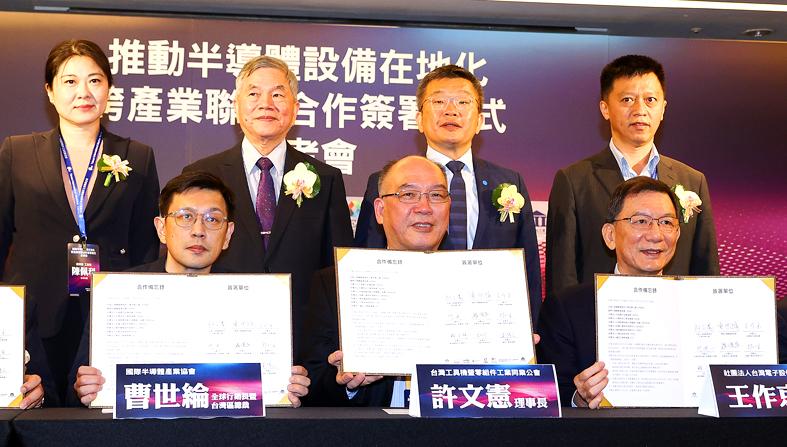Five industry associations and four industry-related nonprofit organizations yesterday signed a memorandum of understanding to promote the localization of semiconductor equipment production.
At the signing ceremony in Taipei, Taiwan Machine Tool and Accessory Builders’ Association (台灣工具機暨零組件公會) chairman Habor Hsu (許文憲) said that Taiwan’s semiconductor industry is overwhelmingly dependent on imported production equipment.
“We have a world-leading semiconductor industry in Taiwan, but 90 percent of our semiconductor manufacturing equipment is imported,” Hsu said.

Photo: CNA
It is time to step up the output of semiconductor manufacturing equipment, he said.
“In the wake of COVID-19 and the US-China trade dispute, international businesses will change where and how they make their products,” Hsu said.
Other trade associations that signed the memorandum were Semiconductor Equipment and Materials International (SEMI, 國際半導體設備與材料產業協會), the Taiwan Electronic Equipment Industry Association (台灣電子設備協會), and the Photonics Industry and Technology Development Association (光電科技工業協進會).
The Taiwan Automation Intelligence and Robotics Association (台灣智慧自動化與機器人協會), the Metal Industries Research and Development Center (金屬工業研究發展中心) and the Precision Machinery Research and Development Center (精密機械研究發展中心) were the signatories from the nonprofit sector.
Taiwan is the world’s largest buyer of semiconductor manufacturing equipment and might this year spend up to US$62.3 billion on the equipment,” SEMI Taiwan president Terry Tsao (曹世綸) said.
“The most important task at hand is to convince international industry leaders to expand their operations to Taiwan,” Tsao said. “This can be the maintenance and repair of components or the assembly of secondary systems. This will create a point of contact that will allow Taiwanese equipment manufacturers to find a new market.”
Vice Premier Shen Jong-chin (沈榮津) said that the government is planning to make Taiwan an “advanced semiconductor production center.”
“The first step is encouraging foreign semiconductor equipment companies to make more of their products here,” Shen said. “We hope that this cross-industry alliance will encourage more international companies to invest in Taiwan.”
Shen said that as Taiwan’s three science parks are operating at almost full capacity, it is time to add a fourth or even a fifth park to support the growth of its semiconductor production chain.
“In the past, too much of the development was focused in the north of Taiwan. Going forward, we are looking for a more even regional development,” Shen said.
However, there are “no concrete plans” for additional science parks yet, he added.
“The paramount issue is securing land and water,” Shen said.

Shares in Taiwan closed at a new high yesterday, the first trading day of the new year, as contract chipmaker Taiwan Semiconductor Manufacturing Co (TSMC, 台積電) continued to break records amid an artificial intelligence (AI) boom, dealers said. The TAIEX closed up 386.21 points, or 1.33 percent, at 29,349.81, with turnover totaling NT$648.844 billion (US$20.65 billion). “Judging from a stronger Taiwan dollar against the US dollar, I think foreign institutional investors returned from the holidays and brought funds into the local market,” Concord Securities Co (康和證券) analyst Kerry Huang (黃志祺) said. “Foreign investors just rebuilt their positions with TSMC as their top target,

REVENUE PERFORMANCE: Cloud and network products, and electronic components saw strong increases, while smart consumer electronics and computing products fell Hon Hai Precision Industry Co (鴻海精密) yesterday posted 26.51 percent quarterly growth in revenue for last quarter to NT$2.6 trillion (US$82.44 billion), the strongest on record for the period and above expectations, but the company forecast a slight revenue dip this quarter due to seasonal factors. On an annual basis, revenue last quarter grew 22.07 percent, the company said. Analysts on average estimated about NT$2.4 trillion increase. Hon Hai, which assembles servers for Nvidia Corp and iPhones for Apple Inc, is expanding its capacity in the US, adding artificial intelligence (AI) server production in Wisconsin and Texas, where it operates established campuses. This

US President Donald Trump on Friday blocked US photonics firm HieFo Corp’s US$3 million acquisition of assets in New Jersey-based aerospace and defense specialist Emcore Corp, citing national security and China-related concerns. In an order released by the White House, Trump said HieFo was “controlled by a citizen of the People’s Republic of China” and that its 2024 acquisition of Emcore’s businesses led the US president to believe that it might “take action that threatens to impair the national security of the United States.” The order did not name the person or detail Trump’s concerns. “The Transaction is hereby prohibited,”

Garment maker Makalot Industrial Co (聚陽) yesterday reported lower-than-expected fourth-quarter revenue of NT$7.93 billion (US$251.44 million), down 9.48 percent from NT$8.76 billion a year earlier. On a quarterly basis, revenue fell 10.83 percent from NT$8.89 billion, company data showed. The figure was also lower than market expectations of NT$8.05 billion, according to data compiled by Yuanta Securities Investment and Consulting Co (元大投顧), which had projected NT$8.22 billion. Makalot’s revenue this quarter would likely increase by a mid-teens percentage as the industry is entering its high season, Yuanta said. Overall, Makalot’s revenue last year totaled NT$34.43 billion, down 3.08 percent from its record NT$35.52